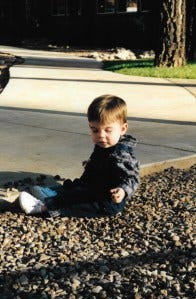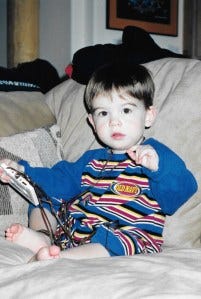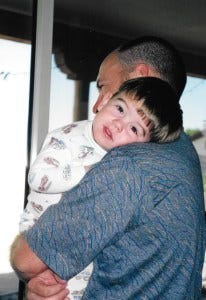By the time I was decorating my 2.5-year-old son’s first picture-communication board with an “autism ribbon,” we had been aware of his lack of speech for well over a year and a half.
My delay in embarking on speech therapy for him wasn’t exactly denial—it wasn't like anyone said "This is Autism" and we refused to believe it. No one had brought up autism yet, and what little I'd heard about it just didn't seem to match my son. Yet.
We danced around the edges of his inevitable diagnosis as our son grew into toddlerhood. He was meeting all of the typical milestones—sitting up, eating solid foods, crawling, grasping, walking. All more or less on schedule.
Except the talking part.
Our little guy babbled a bit. There were a few times when we thought words were coming, but what sounded like “Da” or “Ma” never coalesced into anything stronger.
He was a happy kid then—very content to play on his own, his lack of interest in playing with other children not yet concerning.
Sure, he didn’t always play with toys in the typical way, preferring to juggle, toss and tumble them, but we didn’t really notice that. We were first-time parents, we didn’t see these subtle “quirks” as anything to be worried about.
Except for his lack of speech, the differences between our silly child and our friends’ lively kids were hard to detect.
This was before the onset of sleepless nights, food aversions, heightened sound sensitivity, anxiety and all the rest of what his autism would bring.
Our only concern then was that our sweet kid wasn’t talking.
At our son’s twelve-month pediatric appointment, and again at a year and a half, we brought up hesitant concerns about our quiet boy.
The doctor asked us a few questions – Does he look you in the eye? Yes.
Our son’s eye contact has always been strong, atypical of many with autism.
Does he let you touch or hug him? Yes.
He was an affectionate kid with us, although I bet there were subtle differences even then that we couldn’t see.
That simple and somewhat dismissive screening completed, his doctor assured us that our child’s speech delay would remedy itself when the kid was ready to talk.
Watch and wait. We’ll talk again in six or eight months. Let’s not worry. Yet.
So, between his first and second birthdays, I treaded water with the mantra, He’ll talk when he’s ready.
Encouragement from family and friends became a standard refrain that year, worry balanced by hope.
He’s a boy, they talk late.
My brother talked late too, he’s fine.
You take such good care of him, he’s got no reason to talk yet!
He's so smart, you can just tell. He'll just start speaking in full sentences any day now…
I even found a book at the library that showcased a “special kind of child” who is late to talk, but given time, not only catches up with but surpasses his peers. That bright yellow book, filled with anecdotal stories of Late-Talking Children who turned out just fine (interspersed with the author's unvarnished opinion about the "dreaded" diagnosis of autism), diverted me from real autism awareness and understanding for a while.
Sheltered by reassurances, I waited for our son to “decide” to talk. We lost some valuable early intervention time during that year, but perhaps it gave me time. Time to be ready. By my son’s two-year well check, I was determined to push our doctor for a referral to a developmental specialist. My son still wasn’t “ready” to talk, but I was a bit more ready for real answers.
2025 note: This piece first appeared on my blog in April 2016, as part of a series in honor of Autism Awareness Month. At the time, I noted: As the parent of an autistic teenager, it’s hard to remember a time when I wasn’t “aware” of autism, since it is such an integral part of our everyday life. But there was a time – in fact, the majority of my life – when I did not know anything about autism. Throughout April, I’ll be sharing a few moments from the months and years just prior to my son’s diagnosis, when the pieces of the "awareness" puzzle were just clicking into place for me.







